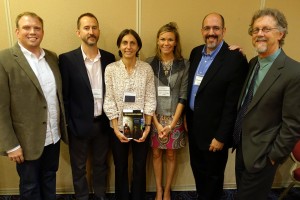 My latest book, co-authored with Gerardo Marti, The Deconstructed Church: Understanding Emerging Christianity (Oxford University Press, 2014) was featured in an Authors Meet Critics session on 14 August at the Association for the Sociology of Religion annual meeting in San Francisco.
My latest book, co-authored with Gerardo Marti, The Deconstructed Church: Understanding Emerging Christianity (Oxford University Press, 2014) was featured in an Authors Meet Critics session on 14 August at the Association for the Sociology of Religion annual meeting in San Francisco.
The panel of critics included Brian Steensland of Indiana University, Rhys Williams of Loyola University-Chicago, and Hilary Davidson of the University of Notre Dame. The panel was organised and convened by Mark Killian of Whitworth University.
Steensland got the discussion started by highlighting what he saw as three of the main contributions of the book:
- It describes in ethnographic detail what the Emerging Church Movement (ECM) is like cross-nationally
- It theorizes about the ECM – what is compelling about it and why it has emerged when it has
- It elaborates on the wider significance of the ECM
Steensland said that one of the book’s “most important” contributions was our framing of the ECM as a “religious orientation,” rather than a religious identity. Our summary of this in the book is as follows (p. 8):
“ … for us, the term orientation rather than identity better captures the package of beliefs, practices and identities shared by people within the ECM. Orientation allows us to convey that there is a wide spectrum of beliefs and practices within the ECM. While people may disagree, they can still be considered part of the movement. It also allows us to recognize that people within the ECM hold multiple identities simultaneously and that identification as “emerging” may be only occasionally important in their everyday lives (if ever). This leads us to characterize the ECM as an institutionalizing structure, made up of a package of beliefs, practices and identities which are continually deconstructed and reframed by the religious institutional entrepreneurs who drive the movement. But Emerging Christians are somewhat unique institutional entrepreneurs, in that one of their primary purposes is to resist the institutionalization of their faith rather than to reform or create new institutions. This desire to resist institutionalization explains our adoption of the term “institutionalizing structure” to describe the swirl of activity generated as Emerging Christians intentionally reframe Christian belief and practice.”
Williams framed his comments around how the book itself presents “a challenge to sociology as a discipline.”
In particular, he said it is a challenge to how we think about organisations. Williams noted that “organisations are not nouns,” in the ECM; rather in The Deconstructed Church we describe Emerging Christians as conceiving of organisations as “verbs” or “gerunds.” The wider question then is, how should sociologists handle this kind of social organisation?
Williams also highlighted our use of Ulrich Beck’s concept of “cooperative egoism” to portray the deliberately “pluralist congregations” of the ECM. In these congregations, individuals have a high degree of autonomy to follow their own spiritual journeys or quests, yet value “community” – even if they do not agree with each other on all (or most) forms of faith or practice. Williams joked that that cooperative egoism is “a perfect orientation for sociologists … because of the high ratio of analysis to action.” At the same time he highlighted how there is a lack of evidence that the cooperative egoism of the ECM promotes the social activism to which so many Emerging Christians say they aspire.
Davidson, like Williams, emphasised that The Deconstructed Church challenges “the conceptual apparatus that the sociology of religion takes for granted.”
For her, this was illustrated by how complicated it is simply to define the ECM, whether as a movement or a tradition or a phenomenon. At the same time, the ECM provides sociologists of religion with insights into what it means to “be a modern religious person … dovetailing with the literature on everyday religion.”
Drawing on her own area of expertise, Davidson noted that trends we identified within the ECM can also be found among “emerging adults,” including interdenominational marriage, privileged social positions, and an emphasis on choice. For example, those Emerging Christians who are part of neo-monastic communities, which may involve relative economic poverty, are making a choice to be part of such communities that those from less privileged backgrounds simply do not have.
Gerardo and I are deeply grateful for these scholars’ engagement with our work and hope that the book continues to stimulate similarly productive reflection and debate.